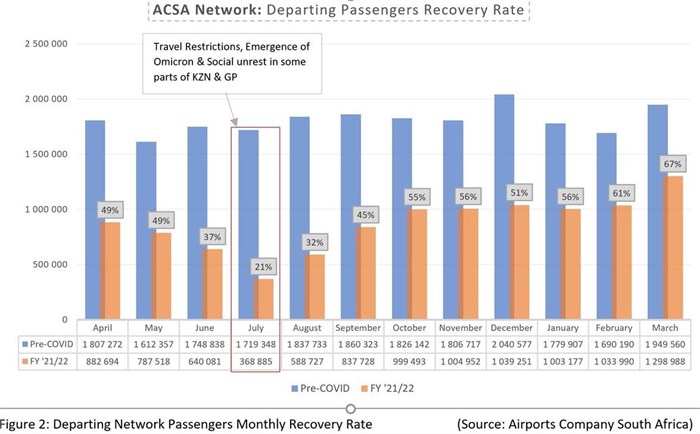
Top stories






AutomotiveHilux Custom Builds offers purpose-built solutions for your business
Toyota South Africa Motors 16 Feb 2026
More news


Marketing & Media
Ads are coming to AI. Does that really have to be such a bad thing?














To put the impact of the pandemic into perspective, figures published by International Air Transport Association (IATA) reveal that 2020 was the worst year on record for the aviation industry. In 2020, only 1.8 billion passengers flew, which was a decrease of 60.2% compared to the 4.5 billion who flew in 2019. Industry-wide air travel demand dropped by 65.9% year-on-year, with international passenger demand decreasing by 75.6% compared to the year before and domestic air passenger demand dropping by 48.8%.
However, Airports Company South Africa (Acsa) has reported that its network recorded a 48% recovery in passenger throughput when compared to similar period in the year leading to the Covid-19 crisis, for the financial year ending March 2022. This as air traffic in the 2021/2022 financial year was impacted by the third and fourth waves of new infections, which were proliferated by the Delta and Omicron variants, respectively.
"Acsa is encouraged by the passenger movement numbers across all of its airports, as they are showing steady growth and recovery for both domestic and international travel,” says Mpumi Mpofu, Acsa CEO

"The domestic segment for the year ending March 2022 has recorded a 56% passenger throughput of the pre-Covid level, while regional and international segments continue to lag. But I must emphasise that different factors affect the recovery rates of the various segments, and thus these rates of rebound cannot be directly compared," says Mpumi.
This is in line with global air travel recovery trends identified by the Airports Council International (ACI), with domestic traffic continuing to drive recovery, while international passenger traffic volume lagged significantly behind domestic traffic recovery in 2021. ACI estimated that global international passenger traffic volumes for 2022 will only reach 27.8% of the 2019 level.
Mpofu points out that Acsa’s regional airports, on the coast and inland, are recovering faster because of their small/soft base, with traffic primarily attributed to travel into these airports being largely domestic and for the purpose of leisure, visiting friends and family/relatives (VFR) traffic.
"On the other hand, the meeting, incentive travel, conferences and exhibitions (MICE) and business market segments have been heavily impacted due to reduced travel budgets and the rapid development of virtual meeting and conferencing platforms. These segments, including government, accounted for over 50% of the traffic at the three international gateway airports in Gauteng, KwaZulu-Natal and Western Cape," says Mpofu.
OR Tambo International Airport (Ortia) pre-Covid (2019/2020) for both international and domestic travel had a total of 1.8 million combined passenger movements for both arrivals and departures. For the year 2021/2022, the airport continues on its recovery path and has had a combined total of 1.3 million passenger movement for both arrivals and departures. Even during its recovery process, Ortia continues to handle the highest number of passenger movements among all Acsa airports.
Additionally, a significant portion of OR Tambo traffic of close to 50% is cross-border travel within the region and global markets, which were severely disrupted by the global travel bans. The rebound in cross-border traffic has accelerated Ortia’s recovery to just under 64% in March 2022, the highest monthly recovery rate since the start of the pandemic.
"It must be emphasised that OR Tambo International’s recovery has lagged due to its air travel demand being largely influenced by corporate/business traffic, which is the most severely affected market segment and its extensive route network covering all habitant continents pre-Covid 19," says Mpofu.
King Shaka International Airport (KSIA) has seen a resurgence in domestic travel, with a combined total of 539,257 domestic passenger movement for 2022/2023. Pre-Covid, Cape Town International Airport (CTIA), for both domestic and international travel, had a combined total of 928,350 passenger movements. CTIA has recorded a combined passenger movement of 698,701 for both domestic and international travel in 2021/22.
George Airport passenger movement numbers have grown since pre-Covid from 33,217 to 35,753 for domestic arrivals. The rest of the regional airports are catching up fast to pre-Covid-19 figures, and ACSA is confident of a full recovery in the next year.
"Regional airports have contributed significantly to ACSA’s recovery, with George and Bram Fischer Airports experiencing passenger through put of over 96% and 84%, respectively, in March 2022. The regional airports market is largely driven by a mix of domestic leisure and VFR traffic and a bit of business, which continues to lead the air travel recovery," concludes Mpofu.